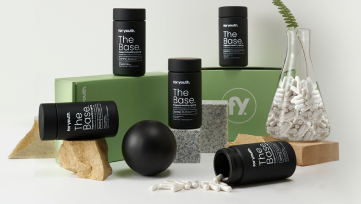NMN vs. Other Anti-Ageing Supplements: What's the Difference?

Are you tired of hearing about the latest anti-ageing supplements and wondering which one is right for you? NMN, or Nicotinamide Mononucleotide, is a rising star in the anti-ageing world, but how does it compare to other popular anti-ageing supplements on the market? Let’s take a closer look at NMN versus other anti-ageing supplements and find out what sets it apart.

Get The Latest On Longevity Delivered To Your Inbox.
By signing up, you consent to receive For Youth emails
- NMN vs. Collagen: Collagen supplements are often touted for their ability to improve skin elasticity and reduce wrinkles. However, NMN offers more comprehensive anti-ageing benefits by targeting multiple cellular pathways, including DNA repair and energy production.
- NMN vs. CoQ10: CoQ10 is another popular anti-ageing supplement that plays a role in energy production and reducing inflammation. However, NMN offers additional benefits such as improving cardiovascular health and cognitive function.
- NMN vs. Vitamin C: Vitamin C is a well-known antioxidant that helps protect against cellular damage. However, NMN has been shown to be more effective in promoting cellular repair and reducing inflammation, making it a more comprehensive anti-ageing supplement.

 Shop our NMN
Shop our NMN 
So, what’s the difference between NMN and other anti-ageing supplements? NMN not only targets multiple cellular pathways but also offers more comprehensive benefits than other popular anti-ageing supplements. By promoting cellular repair, reducing oxidative stress, improving cardiovascular health, and cognitive function, NMN is quickly becoming the go-to anti-ageing supplement for those looking to stay youthful and healthy.
In conclusion, while there are many anti-ageing supplements on the market, NMN is a standout for its comprehensive benefits and effectiveness. By incorporating NMN into your daily supplement regimen, you can take a proactive step towards promoting cellular repair and reducing oxidative stress, helping you look and feel younger for longer.

 Shop our NMN
Shop our NMN 
FAQ:
1. What is NMN, and how does it work for anti-aging?
Nicotinamide mononucleotide (NMN) is a precursor to nicotinamide adenine dinucleotide (NAD+), a critical coenzyme in all cells. NMN works by enhancing the levels of NAD+ in the body, which tends to decrease with age. By boosting NAD+ levels, NMN supports various biofunctions such as DNA repair, energy production, and cell metabolism, contributing to a delay in the aging process.
2. How does NMN compare to other popular anti-aging supplements like resveratrol?
Resveratrol is an antioxidant found in the skin of grapes, berries, and peanuts. It is known for its potential to activate sirtuins, a family of proteins that play a key role in longevity. While resveratrol also aims to promote anti-aging through sirtuin activation, NMN works more directly by replenishing NAD+ levels. Together, they can act synergistically as resveratrol’s activation of sirtuins requires sufficient NAD+ levels, to which NMN contributes.
3. Is NMN more effective than collagen supplements for anti-aging?
Collagen supplements target the aging process differently. They are primarily focused on improving skin elasticity, reducing wrinkles, and joint health by supplying the body with collagen peptides. On the other hand, NMN addresses aging at a cellular level by boosting NAD+ and supporting cellular health and metabolism. Whether NMN is more effective than collagen depends on the specific anti-aging goals: skin and joint appearance or cellular vitality.
4. Does NMN have any advantages over antioxidants like Coenzyme Q10 (CoQ10)?
Coenzyme Q10 (CoQ10) is an antioxidant that helps generate energy in cells and protects them from oxidative damage. While CoQ10 addresses mitochondrial efficiency and oxidative stress, NMN enhances NAD+ levels, indirectly supporting cellular energy production and overall cell function. NMN might offer broader systemic benefits compared to CoQ10’s targeted antioxidant protection but aligning your supplement choice with your specific concerns is advisable.
5. What makes NMN different from supplements that contain nicotinamide riboside (NR)?
Nicotinamide riboside (NR) and NMN are both NAD+ precursors and share similar mechanisms of action in raising NAD+ levels. The main difference lies in their molecular structure and the pathway they follow to become NAD+. While both are effective at increasing NAD+ levels and promoting anti-aging effects, preferences between them may boil down to individual responses, availability, and cost.
6. Can taking NMN replace a healthy lifestyle in combating aging?
While NMN shows promise in combating aging at the cellular level, it should not replace a healthy lifestyle. Optimal aging also involves balanced nutrition, regular exercise, adequate sleep, stress management, and avoiding harmful behaviors like smoking. Supplements like NMN can complement these lifestyle choices but are not a substitute.
7. Are there any known side effects of using NMN compared to other supplements?
As of the latest research, NMN is considered safe with few reported side effects, similar to other well-studied supplements like resveratrol and CoQ10. However, individual reactions can vary, and long-term effects are still under observation. It’s crucial to consult with a healthcare provider before commencing any new supplement regimen, especially for individuals on medications or with underlying health conditions.
8. Where can I find reliable information to further compare NMN with other anti-aging supplements?
Reliable sources include peer-reviewed scientific journals, reputable healthcare websites (.gov, .edu, or .org domains), and professional health practitioners specializing in aging or nutritional science. Stay cautious of sources with potential biases, such as those directly selling supplements, and look for information backed by clinical research and trials.








